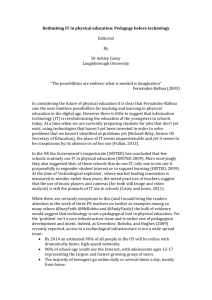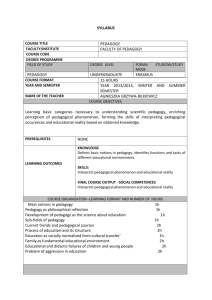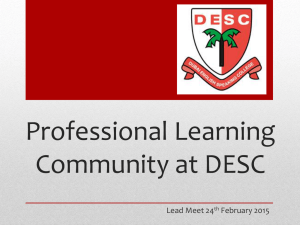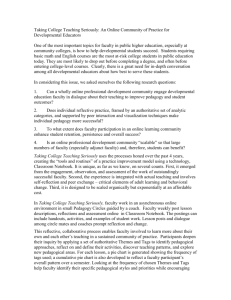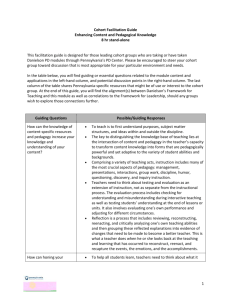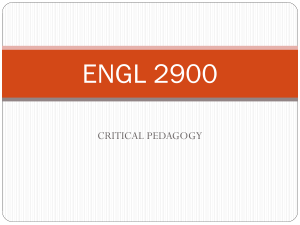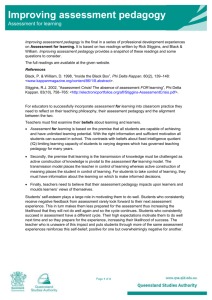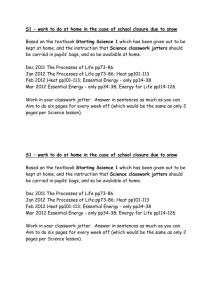ENGL 3400: Pedagogy and Writing - The University of West Georgia
advertisement
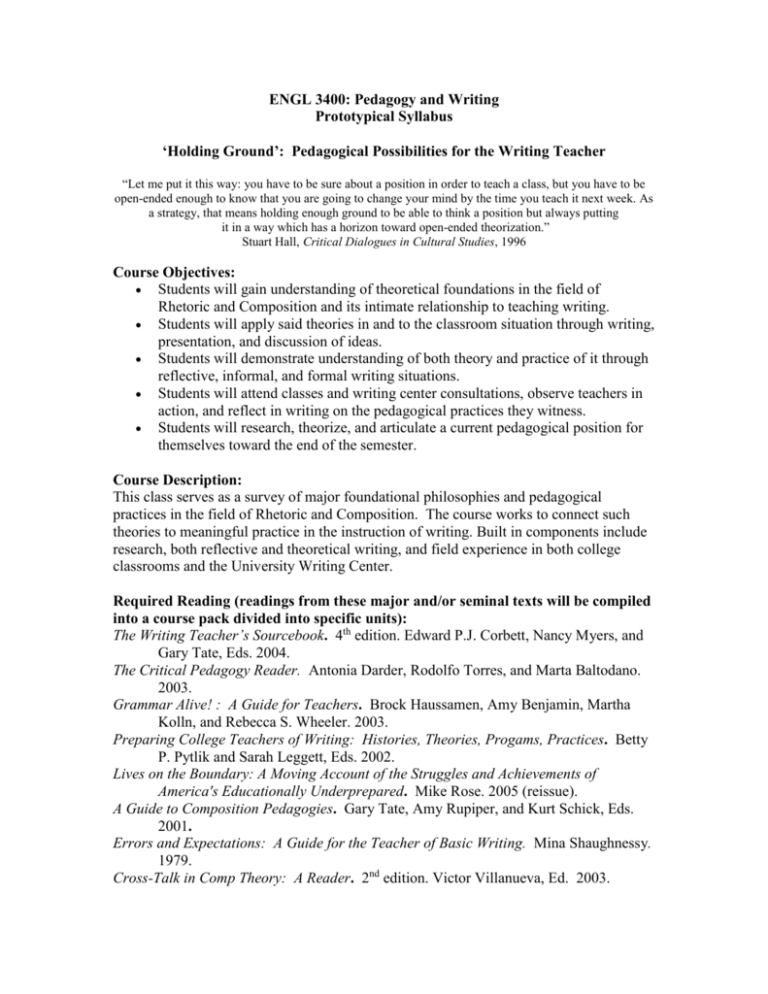
ENGL 3400: Pedagogy and Writing Prototypical Syllabus ‘Holding Ground’: Pedagogical Possibilities for the Writing Teacher “Let me put it this way: you have to be sure about a position in order to teach a class, but you have to be open-ended enough to know that you are going to change your mind by the time you teach it next week. As a strategy, that means holding enough ground to be able to think a position but always putting it in a way which has a horizon toward open-ended theorization.” Stuart Hall, Critical Dialogues in Cultural Studies, 1996 Course Objectives: Students will gain understanding of theoretical foundations in the field of Rhetoric and Composition and its intimate relationship to teaching writing. Students will apply said theories in and to the classroom situation through writing, presentation, and discussion of ideas. Students will demonstrate understanding of both theory and practice of it through reflective, informal, and formal writing situations. Students will attend classes and writing center consultations, observe teachers in action, and reflect in writing on the pedagogical practices they witness. Students will research, theorize, and articulate a current pedagogical position for themselves toward the end of the semester. Course Description: This class serves as a survey of major foundational philosophies and pedagogical practices in the field of Rhetoric and Composition. The course works to connect such theories to meaningful practice in the instruction of writing. Built in components include research, both reflective and theoretical writing, and field experience in both college classrooms and the University Writing Center. Required Reading (readings from these major and/or seminal texts will be compiled into a course pack divided into specific units): The Writing Teacher’s Sourcebook. 4th edition. Edward P.J. Corbett, Nancy Myers, and Gary Tate, Eds. 2004. The Critical Pedagogy Reader. Antonia Darder, Rodolfo Torres, and Marta Baltodano. 2003. Grammar Alive! : A Guide for Teachers. Brock Haussamen, Amy Benjamin, Martha Kolln, and Rebecca S. Wheeler. 2003. Preparing College Teachers of Writing: Histories, Theories, Progams, Practices. Betty P. Pytlik and Sarah Leggett, Eds. 2002. Lives on the Boundary: A Moving Account of the Struggles and Achievements of America's Educationally Underprepared. Mike Rose. 2005 (reissue). A Guide to Composition Pedagogies. Gary Tate, Amy Rupiper, and Kurt Schick, Eds. 2001. Errors and Expectations: A Guide for the Teacher of Basic Writing. Mina Shaughnessy. 1979. Cross-Talk in Comp Theory: A Reader. 2nd edition. Victor Villanueva, Ed. 2003. Units of Study: Shared assumptions and contexts in the field of writing instruction Foundational Pedagogical Strategies: o Expressivist Pedagogy o Rhetorical Pedagogy o Collaborative Pedagogy o Grammar convention and usage and the teaching of grammar o Critical Pedagogy Pedagogy Problematized and (Re)Solved o Race, Gender, and Class(rooms) o Developmental Writers o Center(s) for Writing o Media Matters: Critical Literacies To the Classroom!: Approaches (interspersed throughout) Major Assignments: Reading Journal: Students will keep an active reading journal comprised of both reflective and analytical pieces related to classroom discussion and assigned readings from texts. Two pages per week are required, and students will turn in journal entries at mid-term and again at the end of the semester. Classroom observation and reflection writing assignments): students will participate in approximately four hours of observation, two in various university 50 or 75 minute writing classrooms and two in the University Writing Center. After their in-class observation of each professional teacher in action, students will write reflection pieces about each class they witness (500 words). Later, students will return to one of their Teaching Observation reflection pieces and use course materials to theorize about the teacher’s pedagogy (500 additional words for a total of 1000). Consultation with instructors before and after students observe is also a must. Further, students will write reflection pieces (500 words) for both of their Writing Center Observations and foster dialog with Writing Center consultants. In brief, then: Teaching Observation: Teaching Observation: Writing Center Observation: Writing Center Observation: Added theorizing: Total for this assignment: 500 words 500 words 500 words 500 words 500 words 2500 words Pedagogy Project: students will first create a sequence of lesson plans that incorporates writing assignments about a particular text for a particular course (composition, literature, business or technical writing, etc.). Secondly, students will write an essay (3-4 pages) that justifies the assignments and explains the pedagogical foundations behind the implemental plan. Capstone Essay: students will compose an essay (7-10 pages) in which they begin to negotiate a current pedagogical position (or a hybridized position) for the instruction of writing. Scholarly research required. Due at the end of our semester of study. Weekly Syllabus: Week One Classwork: Course Introduction Context(s): Assumptions and Foundations (essays and discussion) Homework: Read and annotate Schedule observe dates and follow-up appointments with recommended observation professors Week Two Classwork: Contexts(s): Assumptions and Foundations (essays and discussion) Homework: Read and annotate Journal writing Attend first Writing Center Observation Week Three Classwork: Foundations: Expressivism, Collaborative Pedagogy, and Practice (essays and discussion) Approaches: Sage on the Stage; Guide on the Side: Classroom Dynamics that Produce Dynamism Homework: Read and annotate Journal writing Turn in First Writing Center Observation reflection piece Week Four Classwork: Foundations: Rhetorical Pedagogy, Grammar Usage, Convention, and Instruction (essays and discussion) Approaches: The Political in the Personal—Grammar Convention, Surface Error Homework: Read and annotate Journal writing Attend second Writing Center Observation Week Five Classwork: Foundations: Rhetorical Pedagogy, Grammar Usage, Convention, and Instruction (cont’d) (essays and discussion) Approaches: Library Day (in preparation for the Pedagogy Project) Approaches: Micro/Macro—Assignments and Lesson Plans Homework: Read and annotate Journal writing Turn in second Writing Center Observation reflection piece Week Six Classwork: Foundations: Critical Pedagogy (essays and discussion) Approaches: The Political Classroom? Homework: Read and annotate Journal writing Add Pedagogical Rationale to one Writing Center Observation reflection piece; turn in Week Seven Classwork: The Probelematization of Pedagogy: Basic Writers (connected back to Grammar and Rhetoric) (essays and discussion) Peer Review, Conferences on Pedagogy Project Homework: Read and annotate Journal writing Attend first Teaching Observation, either this week or next Week Eight Classwork: Writing Pedagogy (Re)Solved: Center(s) for Writing (essays and discussion) Approaches: The One-On-One and Deconstructive Technique in the Writing Center Homework: Read and annotate Journal writing First half of Reading Journal due Meet with Observation professor, either this week or next, for follow-up Week Nine Classwork: The Probelematization of Pedagogy: Race, Gender, and Class(rooms) (essays and discussion) Homework: Read and annotate Journal writing Week Ten Classwork: The Probelematization of Pedagogy: Race, Gender, and Class(rooms) (cont’d) (essays and discussion) Homework: Read and annotate Journal writing Pedagogy Project Due Week Eleven Classwork: The Probelematization of Pedagogy: Technology in the Classroom (connect back to Grammar Convention and Writing Centers) (essays and discussion) Approaches: Paperless Papers? Homework: Read and annotate Journal writing Attend second Teaching Observation this week or next Week Twelve Classwork: Problematization of Pedagogy: Technology in the Classroom and Media Matters (essays and discussion) Approaches: Books as Broccoli? Film as Ice Cream?—a Balanced Academic Diet Homework: Read and annotate Journal writing Meet with second Observation professor, either this week or next, for follow-up Week Thirteen Classwork: The Problematization of Pedagogy: Media Matters (cont’d) (essays and discussion) Approaches: Cinematic, Dramatic, Cultural—Film in the Classroom Homework: Read and annotate Journal writing Both Teaching Observation reflection pieces due Week Fourteen Classwork: Project Work: claims, Annotated Bibliographies, probable structures Homework: Read and annotate Finish journal writing Add Pedagogical Rationale to one Teaching Observation reflection piece; turn in Week Fifteen Classwork: Discuss observations and pedagogies present Conference for final projects Homework: Research for, plan, and write final project Final Journals due Week Sixteen Classwork: Evaluations Course Wrap-Up Holding Ground: Reflections on Teaching Writing Homework: Final Projects Due at the end of the examination period
